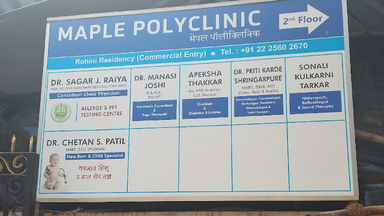Maple Polyclinic
Dietitian/Nutritionist Clinic
About Clinic
Our medical care facility offers treatments from the best doctors in the field of Dietitian/ Nutritionist, Renal Dietician, Sports Nutritionist.Our goal is to provide a compassionate profe...read more
Clinic Timing
Clinic Location
Clinic Images
Videos
Hi friends,
This is dietician Apeksha Thakkar, a clinical dietician. I often encounter cases in my daily practice not only with weight loss, weight gain or some other lifestyle problems but also with stress-related issue. Stress is something which is not visible and hence it is given least importance. So it works on your both physical and mental well being. Stress is often produced due to production of excess of cortisol, a hormone which is secreted by adrenal glands in the body in the state of shock, in the state of trauma and in the state of depression. Today I am going to share few nutrition tips on how can one manage stress with the help of nutrition. The first and important thing to include in your daily diet is food sources rich in Omega 3 fats. Omega 3 fats make sure that the the cortisol hormone which is produced by adrenaline glands are kept to minimum and it also improves the production of serotonin in the blood. So, food sources which are rich in Omega 3 fats are walnuts, almonds, fish, green leafy vegetables, chia seeds and flax seeds. It's very important to make them as a part of your daily balanced diet.
Second is dark chocolates.Researchers have proven that dark chocolate which have 70% and above coco percentage are very good to calm down your brain neurons and it also helps in flushing out serotonin, excess of cortisol in the blood. So it's very important that a few pieces of dark chocolates are part of your daily routine. Third is rich sources of vitamin c. Vitamin c is a powerful antioxidant and it's also a water soluble vitamin which helps to flush out excess of cortisol in the blood. It is available in abundance and it has to be a part of your daily diet. Fourth is dehydration. Often people who are dehydrated you know their cortisol levels are always at peak. It's very important to make sure that your body is well hydrated to make sure that cortisol levels are manageable in the blood.
Fifth and most important point is sleep. Sleep is something and it is often seen that cortisol levels are high in people who are sleep deprived, who are insomniacs. So it's it's a very important to get a 7 to 8 hours of good quality sleep to ensure that the cortisol levels are at minimum. Sixth exercise. Exercise helps in production of hormones and also the release of chemicals called endorphins which are ‘make me feel good’ chemicals. Over-exercise can sometimes produce the production of cortisol and maybe the levels might go out of range. So it's very important to get your regular exercise done based on your requirement under a professional guidance. Last but not the least it is very important to stay positive, to stay content and also practice non-therapeutic things like yoga and meditation. It helps to improve the quality of life and it also helps in weight management. For any further diet consultation you can contact me online for the personalized and structured diet.
Thank you.
Doctor in Maple Polyclinic
Doctor in Maple Polyclinic
Dt. Apeksha Thakkar
Patient Review Highlights
Maple Polyclinic Reviews
Md Arf
Oct 22, 2020Dt. Apeksha Thakkar provides answers that are caring. I want to consult with you
Darter
Oct 15, 2020Dt. Apeksha Thakkar provides answers that are professional. Thank you Dt.Apeksha Thakkar.
Apeksha Thakkar
Nov 16, 2016I found the answers provided by the Dt. Apeksha Thakkar to be knowledgeable, nurturing, professional, prompt and very helpful. She gives apt solutions to the problems.
Verified
Mar 31, 2017The experience was at par. The doctor consulted me very patiently and came up with the practical solutions.
Dinesh
Aug 14, 2018Dt. Apeksha Thakkar provides answers that are very helpful. Very good

